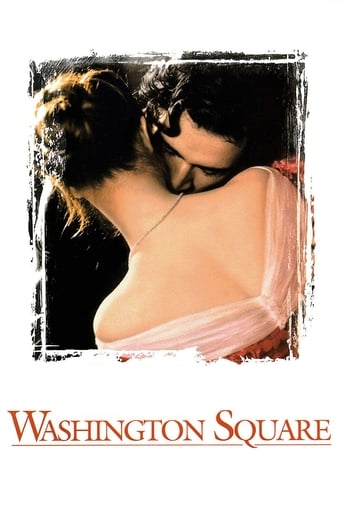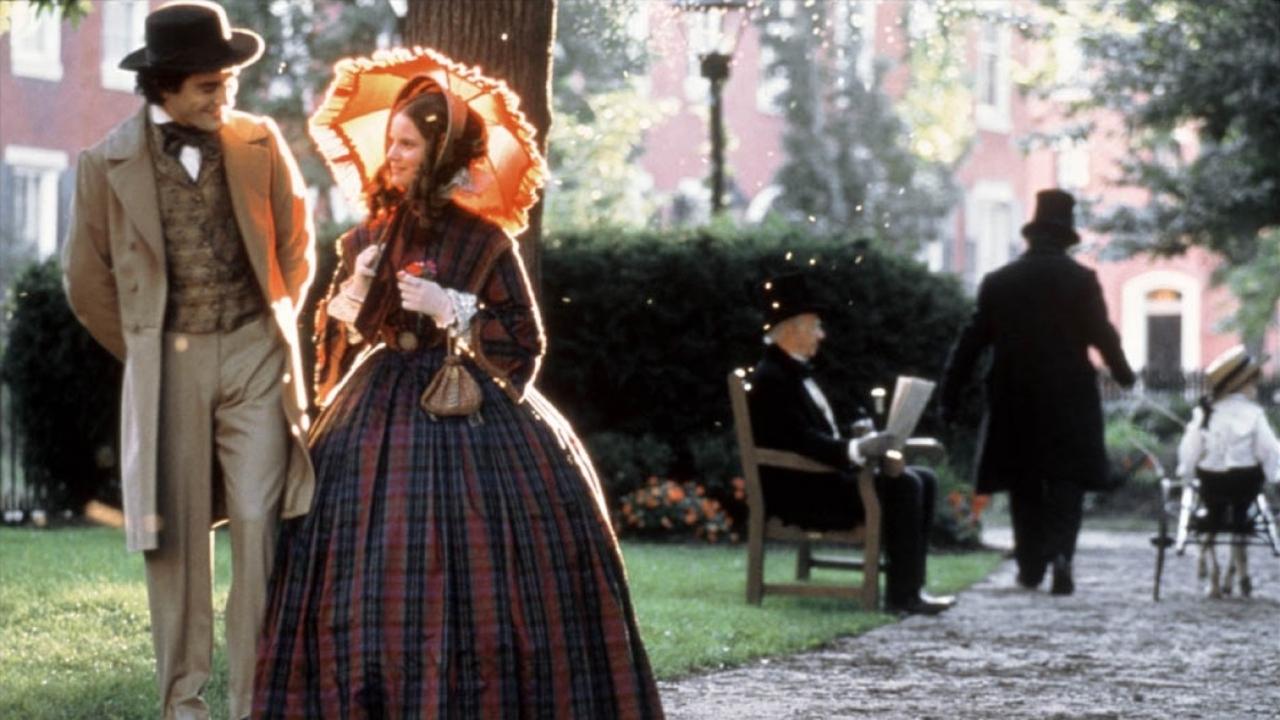nammage
(This review may spoil the novel)I'm not really going to talk too much on the film; I will touch on it. I read a review on here last night that prompted me to read the book. Read half last night, and the other half this morning. I'm not really a fan of Henry James. Never cared for his work, always found him egotistical and condescending of his readers. This film is nothing like the book in that guise. Also, the father in the book was egotistical, condescending, crude, and unloving of anyone, probably even himself. He did love his wife and son but they died; he did not love his daughter. It wasn't her he was protecting, it was Catherine's money she inherited, and his money, of course. The entire novel is solely about two things: money and Catherine: everyone loves the money (but Catherine) and no one loves Catherine but Catherine loves everyone. Don't get me wrong: she's used to wealth and like anyone, she cares in that guise but she would gladly give it up for love. Catherine loves her father, her Aunt, Morris, even herself. She's filled with love and each of those characters, in the novel, breaks her heart one by one. In the novel the Aunt fantasizes a lot, she's carefree, jubilant, and a bit of a child in her own way but does fear her brother. In the film she's made into a maid of the daughter, and fears her brother. In the book she's young looking and attractive. Nothing against Maggie Smith but she's not young looking or attractive in the film. Catherine is a strong person. Morris is weak. He wants the money, and in the novel he's not shy about expressing that to everyone because he's poor, without employment (for the most part), and he squanders everything; in some sense he believes he can make a standing with Catherine's money and future inheritance. The part in the film where he states with passion he doesn't care about Catherine's father's money is a lie. Especially to the character of the book. Now, while in the novel I don't believe he actually loves or ever loved Catherine I did feel he cared about her well-being. He wasn't total scum but close to it. He was still scum because Catherine already had an inheritance from her mother she received $10,000 a year. In today's dollars, that's almost $200,000 a year. She, in her own right, was already very wealthy. Of course the father's wealth was $30,000 per year which equates to almost $900,000 in today's money. And Morris wanted that, too! But he knew of being poor and I think he cared enough about her not to want her in that position.The father is total scum. He cares nothing for his daughter's well- being except in reflection of himself but he'd gladly have her be a pauper to prove himself right; and his entire life, from the moment that Morris comes into his daughter's life, is to prove that very point. However, in the novel he actually liked Morris. The only thing he didn't like was him marrying his daughter. Also, in the novel, the father is very sarcastic. That does not show in the film, and he's forthright with Catherine in the sense that he allows her to do as she pleases but mentions in heartbreaking mannerisms how disappointed he will be if she goes ahead and does the things he doesn't care for. The film, he's not like that all. Not sarcastic, doesn't really let her do what she wants, and seems pretty tyrannical; like the scene in the film on the cliff. I thought he was going to push her over. That scene never happened in the novel--or the urination scene, prostitution scene etc.,--Yes, they went on a long walk and got lost but there was no implication he wanted to kill his own daughter -- how would that look? He's all about appearance in the novel. Seemed over-dramatic, in my opinion.The Aunt is a bit mischievous in the novel. Poking her nose where it most likely doesn't belong only to make her brother's ego bruised without repair; a sense of perhaps comeuppance for the way he treated her, or perhaps even stranger in a sort of crush on Morris though the novel calls it a sort of mother/son or brother/sister relationship; the latter probably in reference to the indifference to her own brother. And, in such manner, in concern to the novel, she may have unknowingly broke Catherine's heart.Catherine, in the novel, feels so unloved by everyone. They're always referring to her as dimwitted, stupid, plain etc., and James makes note that she does have her strengths and qualities that everyone seems to disregard as nothing but childish musings. But, she goes on loving them, even to the end. Even when you believe she has finally given up and relented to the fact she can give no more love. No! She still loves but as stated: she's not dimwitted and stupid. In the film, she's always sad, or crying, or slow to recognize the truth of things. As much as I do not care for James, he did not write that as Catherine in the novel. At least not in my viewpoint. And though Catherine recognizes in the film the cruelty of who and what her father is, it only seems to be mentioned at the end of the film. Morris mentions the cruelty of who he really is, and as a young woman in love, she doesn't care but as an "old maid" of 40 at the end of the novel, while you know she still loves Morris, her strength of knowing that while she does love him he'll never love her, only her money, and her father's money.The novel has passion, the film does not.
SnoopyStyle
Catherine Sloper (Jennifer Jason Leigh) was a chubby, bumbling only child. Her mother died in childbirth. Her father Dr. Austin Sloper (Albert Finney) is dismissive of her. He raised her along with her Aunt Lavinia Penniman (Maggie Smith). At her cousin Marian Almond (Jennifer Garner)'s engagement party, the socially awkward Catherine is introduced to Morris Townsend (Ben Chaplin) who seems to be actually interested in her. Her father assumes that Morris is more interested in her inheritance.The younger Jennifer Jason Leigh always brought an innocence to her characters. She sidelines her usual sass in this one and she is definitely no prostitute here. I think her character needs a plainer looking girl but JJL is terrific nevertheless. The acting is first rate from Finney and Maggie Smith. It's a little slow at times but these are compelling performances.
chunkymonkey24
If you liked this movie, then you should try William Wyler's "The Heiress" (1949) featuring GWTW's Melanie, Olivia de Havilland and Montgomery Clift. Both of these movies contain moving performances from all of the lead actors. Catherine Sloper is skillfully portrayed as an unworldly, naive, young woman who falls for financially-unmatched, well-cultured, dashing Morris Townsend. The overprotective yet unloving Dr. Austin Sloper, Catherine's father, will make your blood boil! Both movies have the making for some intense soap opera-like drama - suspenseful in every regard, keeps you reaching for that bowl of popcorn or that box of Kleenex. To truly understand the plight of the young lovers and especially to get a sense of the tension behind the relationship between daughter and father, one must view "The Heiress" and "Washington Square" for the two films are lovely by themselves, but they certainly complement each other. You'll see what I mean after watching both ;) Enjoy!
Abby-9
I rented WS in order to compare Jennifer Jason Leigh's performance in this with her performance in Kansas City. Both are period pieces, and in both i sensed her willingness to submerge a modern self into the demands of the historic period. This is frightening to behold--Albert Finney, her widowed father, is rock-hard, with glimpses of natural paternal sentiment that only make his determined hardness the more monstrous. So, his daughter Katherine is his victim--a victim of culture, a victim of circumstance--a victim of miscommunications, a victim of her lover, of her aunt? It's all a little hard to bear, except that, as the motif of endurance emerges, the formation of a protective shell over the passions of the young is, finally, a relief. I don't know if there is enough popcorn and chocolate/caramel/you-name-it to make sitting through this story actually enjoyable. Beautifully dressed and accompanied by exquisite score, it's a tragedy with a conclusion of unillumined defeat. Although Katherine, Leigh's role, keeps for herself, privately, the apparent pleasure of the memory of passion. Is this James's modern leaning? Anyway, I rated it high, because as a window into history it's at least fascinating.



 AD
AD




